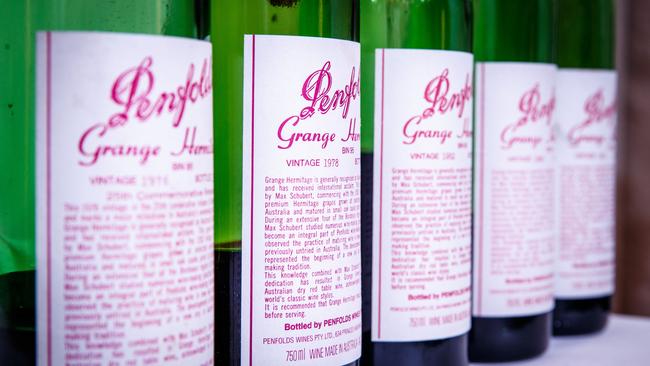Treasury Wine has warned of lower earnings due to a drop in cheap wine sales
Treasury Wine Estates boss Tim Ford believes the winemaker must wean itself off cheap wines and focus on luxury brands such as Penfolds.

Business
Don't miss out on the headlines from Business. Followed categories will be added to My News.
Treasury Wine Estates chief executive Tim Ford believes the winemaker must wean itself off cheap wines, which are in a structural and inevitable decline, as he pivots to luxury brands such as Penfolds, whose demand from Shanghai to New York is outstripping supply.
The reopening of China to Australian wine following the removal of crippling tariffs, as well as Treasury Wine’s leading portfolio of premium and luxury wine brands in the US, has fuelled robust demand for its more expensive wines, led by the Penfolds range, even allowing Mr Ford to contemplate another price rise for Penfolds – on top of an average 6 per cent rise last year – as drinkers rush the brand.
However, despite surging earnings from these premium wines as Chinese drinkers load up on Penfolds and US shoppers fill their baskets with its Napa Valley wines, the company’s rump of commercial brands such as Wolf Blass, Lindeman’s and Yellowglen has proved an earnings drag. Also underperforming recently has been its former blockbuster wine 19 Crimes, fronted by rapper Snoop Dogg, that suffered double-digit sales declines in the key US market and is showing no signs of revival despite the winemaker throwing a string of marketing initiatives at the brand.
“Consumers everywhere around the world are drinking less wine and drinking higher priced wine … and I think low-end, low-price commercial wines will continue to decline for years ahead,” Mr Ford told The Australian after Treasury Wine reported a 19.6 per cent increase in half-year revenue to $1.57bn, as net profit rose 32.5 per cent to $220.9m. The interim dividend was increased to 20c a share, from 17c, and is payable on April 2.
“The majority of our earnings and nearly all of the growth comes from the luxury portfolios and that will just continue over the next years. That’s our strategy, a luxury-led growth strategy, through Penfolds and Treasury Americas – that is the real heart of this business now.
“You have to go where the consumers are going.”
This widening split within the Treasury Wine business – for example, between its pricey Penfolds Grange and “cheap and cheerful” Squealing Pig – was laid bare on Thursday when the company unveiled its interim results that, although showing a strong uplift in sales, profits and dividends, was tarnished by a 50 per cent collapse in wine earnings from its commercial portfolio.

These commercial wines were also a strain on overall group growth, and the winemaker blamed the underperformance of the commercial division for a narrowing of its expected earnings for fiscal 2025 to be about $780m, which is at the lower end of the previously guided range of $780m-$810m.
This downgrade sent shares in Treasury Wine falling more than 7.5 per cent, before closing down 5.74 per cent at $10.51.
However, many of those commercial wines will prove a heavy millstone for some time after the company also revealed on Thursday that efforts to sell Wolf Blass, Lindeman’s, Yellowglen and Blossom Hill failed to find a buyer at a price that stacked up.
Treasury Wine has targeted Penfolds and its American operations, both anchored in luxury wine, as the “clear drivers” of its future growth agenda, with the reopening of the China market also buttressing luxury wine sales – taking some of the pain away from the weaker performance elsewhere in the company.
Its luxury-focused Penfolds division reported a 33.9 per cent increase in earnings to $250.2m, helped by the re-entering into the China market after the crippling tariffs on Australian wine was removed. The division’s performance was led by the re-establishment of the Australian-made Penfolds wine getting back into China, where there had been strong demand from customers, the company said.
Additionally, the positive depletions momentum for Penfolds continued in several other key Asian markets, including Hong Kong, Thailand and Malaysia. Outside of Asia, sales were affected by the partial reallocation of the Penfolds Bin and Icon portfolio to support the rebuilding of distribution in China, with continued growth across the broader portfolio supporting the delivery of modest sales declines in Europe, Australia and New Zealand.
Such was the huge demand for Penfolds in China, as well as shortages elsewhere as Treasury Wine rushed stock into the region, that Mr Ford was considering another price increase for the Penfolds range following an average price rise of 6 per cent last year for the Penfolds Bin and Icon range.
“Pricing is reviewed annually with Penfolds based on what we’ve got on a good sample of what the demand is globally around the world, which we will review in about March or April each year,” he said.
“So that’s on our agenda to do so. But it’s too early to say at this point. But the reality is, demand is well ahead of supply across the globe and the success of the re-establishment of China is driving that in all markets.”
Meanwhile, in the December half, Treasury Americas reported a 66.9 per cent increase in earnings to $155.3m as sales increased 41 per cent, driven by the acquisition of DAOU. Excluding DAOU, sales for the Treasury Americas luxury portfolio declined 8.5 per cent, reflecting below-plan performance in US trade, direct sales to consumers and lower sales as discounting was reined in.
Its cheap, commercial wines division, Treasury Premium Brands, reported a 49.9 per cent decrease in earnings to $22.9m. The result was driven by continued commercial and premium sales declines, reflecting softness in consumer demand for wine at lower price points, and an underperformance relative to the category.
Originally published as Treasury Wine has warned of lower earnings due to a drop in cheap wine sales



